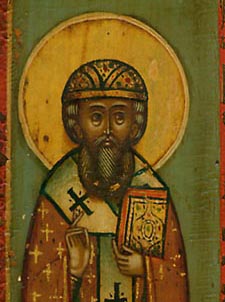Saint Averkios the Wonderworker, Bishop of Hieropolis, Equal of the Apostles

The Holy Hierarch Averkios of Hieropolis lived in Phrygia during the second century. The city of Hieropolis was inhabited by many pagans and very few Christians. The Saint prayed to the Lord for the salvation of their souls, and that they might be numbered among God’s chosen flock. An Angel appeared and bade Saint Averkios to destroy the idols in the pagan temple. He obeyed this command with zeal. Hearing that the idol-worshippers wanted to kill him, the Saint went to a place where people had gathered and openly denounced the failure of the pagans when they attempted to seize him.
At that moment three demon-possessed youths in the crowd cried out. The people were dumbfounded as the Hierarch expelled demons from them by his prayers. Seeing the youths restored to normal, the people of Hieropolis asked Saint Averkios to instruct them in the Christian Faith, and then they received Holy Baptism.
After this Saint Averkios went to the surrounding cities and villages, healing the sick and preaching the Kingdom of God. With his preaching he made the rounds of Syria, Cilicia, Mesopotamia, he also visited Rome. Everywhere he went he converted multitudes of people to Christ. For many years he guarded the Church against heretics, confirming Christians in the Faith, and setting the prodigal upon the path of righteousness. He also healed the sick and proclaimed the glory of Christ. Because of his great works, Saint Averkios is called an “Equal of the Apostles.”
Saint Averkios returned home to Hieropolis, where he soon rested from his labors. After his repose, many miracles took place at his tomb. He wrote his own epitaph, and it was carved on his tombstone, which is now in the Lateran Museum.
The skull of Saint Averkios is located in the Monastery of Most Pure Theotokos on the island of Andros. Fragments from the Holy Relic of Saint Averkios are also found in the Monasteries of Karakalou on the Holy Mountain, at Proussos in Evritania, and Phaneromeni in Salamis.
